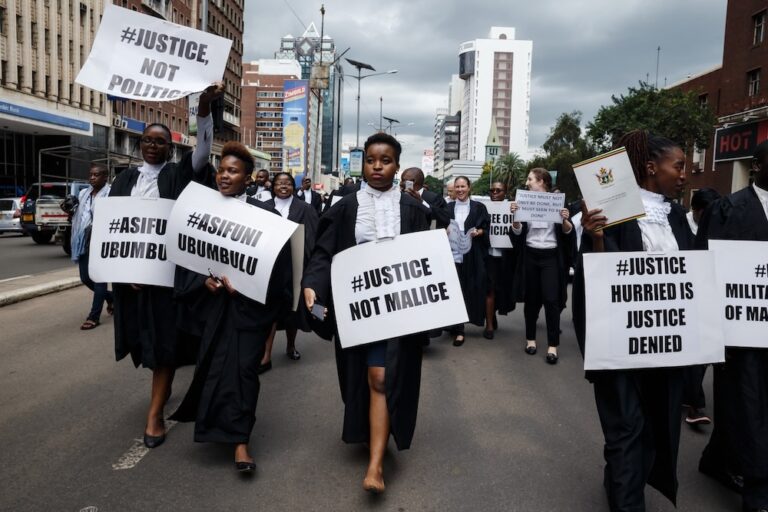(MISA/IFEX) – The Supreme Court has thrown out an urgent application by three journalists seeking the determination of their matter in which they are challenging the constitutionality of some clauses of the Access to Information and Protection of Privacy Act. On Thursday 16 May 2002, the court ruled that journalists Jan Raath, Andrew Meldrum and […]
(MISA/IFEX) – The Supreme Court has thrown out an urgent application by three journalists seeking the determination of their matter in which they are challenging the constitutionality of some clauses of the Access to Information and Protection of Privacy Act.
On Thursday 16 May 2002, the court ruled that journalists Jan Raath, Andrew Meldrum and Peta Thornycroft must follow the normal procedure, as there are no sufficient grounds to warrant the case being dealt with as an urgent matter. Beatrice Mtetwa, the journalists’ lawyer, was informed in a letter from the Supreme Court Registrar that their urgent application was placed before a judge in the chambers who said the matter was not urgent and instructed the applicants to follow the normal procedure.
The three journalists are questioning the constitutionality of certain sections of the act and want them repealed. The act mentions the establishment of a Media and Information Commission that will be responsible for the accreditation of journalists among other things. The commission has still not been set up as the act came into effect in March.
“As a result, the applicants have not been able to apply to the commission if they wish to do so. In my professional view, it is imperative that the application and constitutionality, or otherwise, of the impugned sections be determined as soon as possible but in any event before 16 June 2002 as the applicants’ guaranteed constitutional rights will be clearly affected,” said the journalists’ lawyer.
Reportedly, as of 16 June it will be unlawful and a criminal offence to practice as a journalist without accreditation from the commission. At the same time, however, the act has a transitional provision which states that any journalist who was accredited before the act’s coming into operation shall be deemed to be accredited until the remainder of the year.
Minister of State for Information and Publicity Jonathan Moyo said in his opposing papers that it was incorrect to state that the journalists would be stripped of their rights on that date. “Any journalist who was accredited before 15 March 2002 shall remain accredited for the remainder of the year 2002. It is therefore denied that any journalist who is not accredited by 16 June 2002, risks arrest unless this matter is heard urgently. The applicants’ rights will not be affected until 31 December 2002, when their press cards expire,” Moyo said.
The minister added that regulations relating to registration and accreditation of journalists were in the process of being drafted. “I am therefore firm in my belief that applicants’ rights are not in immediate question or danger. In the circumstances, I maintain there’s no urgency in this matter and respectfully submit that it should be dealt with in accordance with the rules of this honourable court but not on an urgent basis,” Moyo said.
Background Information
In papers filed at the Supreme Court, Raath, Meldrum and Thornycroft asked the court to declare Sections 71 (1), 79 (2), 79 (6), 80 and 83 of the Access to Information and Protection of Privacy Act unconstitutional. The journalists argued these sections contravene Section 20 (1) of the Zimbabwe constitution, which guarantees freedom of expression, receiving and imparting information as a right.


